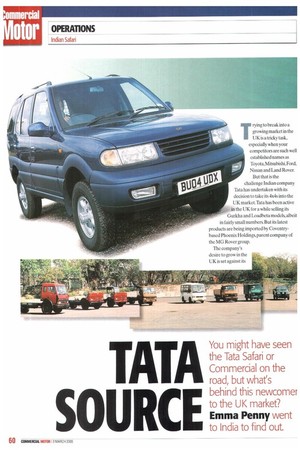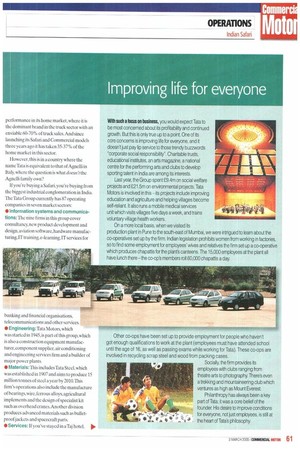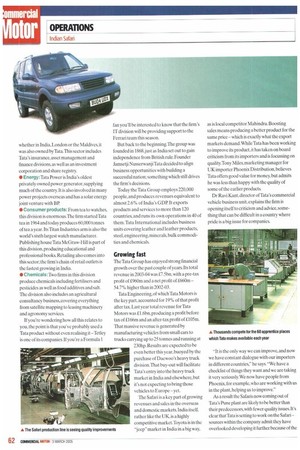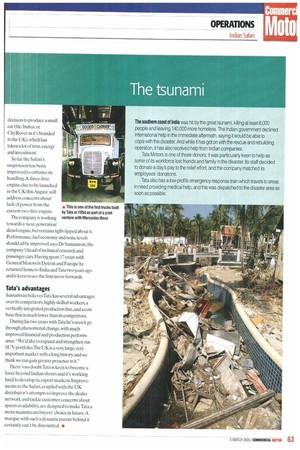T rying to break into a growing market in the UK
Page 62

Page 63

Page 64

Page 65

If you've noticed an error in this article please click here to report it so we can fix it.
is a tricky task, especially when your competitors are such well established names as Toyota,Mitsubishi,Ford, Nissan and Land Rover.
But that is the challenge Indian company Tata has undertaken with its decision to take its 4x4s into the UK market. Tata has been active in the UK for a while selling its Gurkha and Loadbeta models, albeit in fairly small numbers. But its latest products are being imported by Coventrybased Phoenix Holdings, parent company of the MG Rover group.
The company's desire to grow in the UK is set against its performance in its home market, where it is the dominant brand in the truck sector with an enviable 60-70% of truck sales. And since launching its Safari and Commercial models three years ago it has taken 35-37% of the home market in this sector.
However, this is in a country where the name Tata is equivalent to that of Agnelli in Italy, where the question is what doesn't the Agnelli family own?
If you're buying a Safari, you're buying from the biggest industrial conglomeration in India. The Tata Group currently has 87 operating companies in seven market sectors: • information systems and communications:The nine firms in this group cover consultancy, new product development and design, aviation software, hardware manufacturing, IT training, e-learning, IT services for banking and financial organisations, telecommunications and other services.
• Engineering:Tata Motors, which was started in 1945, is part of this group, which is also a construction equipment manufacturer, component supplier, air conditioning and engineering services firm and a builder of major power plants.
• Materials: This includes Tata Steel, which was established in 1907 and aims to produce 15 million tonnes of steel a year by 2010.This firm's operations also include the manufacture of bearings, wire, ferrous alloys, agricultural implements and the design of specialist kit such as overhead cranes. Another division produces advanced materials such as bulletproofj ackets and spacecraft parts.
• Services: If you've stayed in a Taj hotel. 111. whether in India, London or the Maldives, it was also owned by Tata.This sector includes Tata's insurance, asset management and finance divisions, as well as an investment corporation and share registry.
• Energy: Tata Power is India's oldest privately owned power generator, supplying much of the country. It is also involved in many power projects overseas and has a solar energy joint venture with BR • Consumer products: From tea to watches, this division is enormous.The firm started Tata tea in 1964 and today produces 60,000 tonnes of tea a year. Its Titan Industries arm is also the world's sixth largest watch manufacturer. Publishing house Tata McGraw-Hill is part of this division, producing educational and professional books. Retailing also comes into this sector; the rilln's chain of retail outlets is the fastest growing in India.
• Chemicals: Two firms in this division produce chemicals including fertilisers and pesticides as well as food additives and salt. The division also includes an agricultural consultancy business, covering everything from satellite mapping to leasing machinery and agronomy services.
If you're wondering how all this relates to you, the point is that you've probably used a Tata product without even realising it —Tetley is one of its companies. If you're a Formula 1 fan you'll be interested to know that the firm's IT division will be providing support to the Ferrari team this season.
But back to the beginning. The group was founded in 1868,just as India set out to gain independence from British rule. Founder Jamsetji Nusserwanji Tata decided to align business opportunities with building a successful nation; something which still drives the firm's decisions.
Today the Tata Group employs 220,000 people, and produces revenues equivalent to almost 2.6% of India's GDP, It exports products and services to more than 120 countries, and runs its own operations in 40 of them. Tata International includes business units covering leather and leather products, steel, engineering, minerals, bulk commodities and chemicals.
Growing fast The Tata Group has enjoyed strong financial growth over the past couple of years. Its total revenue in 2003-04 was f7.5bn, with a pre-tax profit of £960m and a net profit of £660m — 54.7% higher than in 2002-03.
Tata Engineering, of which Tata Motors is the key part, accounted for 19% of that profit after tax. Last year total revenue for Tata Motors was f1.6bn, producing a profit before tax off 166m and an after-tax profit off 105m. That massive revenue is generated by manufacturing vehicles from small cars to trucks carrying up to 25 tonnes and running at 230hp. Results are expected to be even better this year, buoyed by the purchase of Daewoo's heavy truck division.That buy-out will facilitate Tata's entry into the heavy truck market in India and elsewhere, but it's not expecting to bring those vehicles to Europe — yet.
The Safari is a key part of growing revenues and sales in the overseas and domestic markets. India itselt rather like the UK, is a highly competitive market.Toyota is in the "jeep" market in India in a big way, as is local competitor Mahindra. Boosting sales means producing a better product for the same price — which is exactly what the export markets demand.While Tata has been working to improve its product, it has taken on board criticism from its importers and is focussing on quality.Tony Miles, marketing manager for UK importer Phoenix Distribution,believes Tata offers good value for money, but admits he was less than happy with the quality of some of the earlier products.
Dr Ravi Kant, director ofTata's commercial vehicle business unit, explains the firm is opening itself to criticism and advice.something that can be difficult in a country where pride is a big issue for companies.
"It is the only way we can improve, and now we have constant dialogue with our importers in different countries," he says. "We have a checklist of things they want and we are taking it very seriously. We now have people from Phoenix, for example, who are working with us in the plant, helping us to improve."
As a result the Safaris now coming out of Tata's Rune plant are likely to be better than their predecessors, with fewer qiiality issuesIt's clear that Tata is setting to work on the Safari— sources within the company admit they have overlooked developing it further because of the decision to produce a small car (the Indica, or CityRoyer as it's branded in the UK), which has taken a lot of time,energy and investment.
So far the Safari's suspension has been improved to enhance its handling.A three-litre engine, due lobe launched in the UK this August, will address concerns about lack of power from the current two-litre engine.
The company is working towards a 'next-generation' diesel engine, but remains tight-lipped about it. Performance,fuel economy and noise levels should all be improved, says Dr Sumantran, the company's head of technical research and passenger cars. Having spent 17 years with General Motors in Detroit and Europe he returned home to India and Tata two years ago and is keen to see the firm move forwards.
Tata's advantages
Sumantran believes Tata has several advantages over its competitors: highly skilled workers, a vertically integrated production line, and a cost base that is much lower than its competitors.
During his two years with Tata he's seen it go through phenomenal change, with much improved financial and production performance: "We'd like to expand and strengthen our SUV portfolio.The UK is a very large, very important market with a long history, and we think we can gain greater presence in it."
There's no d oubt Tata is keen to become a force beyond Indian shores and it's working hard to develop its export markets. Improvements to the Safari,coupled with the UK distributor's attempts to improve the dealer network and tackle customer concerns about spares availability, are designed to make Tata a more mainstream buyers' choice in future.A marque with such a dynamic parent behind it certainly can't be discounted. is










































































































































































































